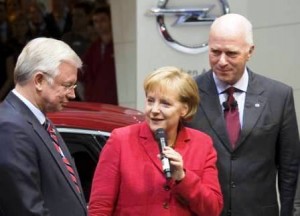Thousands of protesters filled the streets in the center of Berlin to protest the Trans-Atlantic Trade and investment Pact, a new proposed trade pact between the U.S. and the European Union that German carmakers have-called vital to their long-term interests.
Participants in the huge demonstration, which attracted more than 200,000 people to the German capital, are concerned the deal will reduce food or environmental standards, endanger jobs and undermine governmental authority.
Supporters of the agreement, which include the German government headed by Chancellor Angela Merkel, insist the agreement will increase exports, helping to fuel economic expansion across Europe, which has been hurt by financial and sovereign debt crises during the past decade.
The German Economy Ministry, in full page newspaper ads in Frankfurter Allgemeine Zeitung and Sueddeutsche Zeitung on Saturday, said the Transatlantic Trade and Investment Pact won’t hurt the quality of life in Europe. It’s in the region’s interest to set rules for global trade, Economy Minister Sigmar Gabriel wrote in the advertisement.
German carmakers, such as Daimler AG, BMW and Volkswagen and the German automotive association, VDA, have advocated for the pact, saying it would lead to the harmonization of critical safety and environmental regulations. Harmonization would reduce costs and expedite product development, Daimler AG chief executive Dieter Zetsche told the company’s shareholders last spring.
(New Trans-Pacific Partnership draws ire of automakers, unions. For more, Click Here.)
Opponents of the deal, which the U.S. and EU began negotiating in 2013 to expand the world’s biggest economic relationship, “Together we are defending our democracy and taking to the streets for fair trade,” the organizers of the Berlin demonstration said in a statement. “The TTIP negotiations based on the current mandate must be stopped. The existing CETA contracts cannot be ratified in their current form.”
The organizers of the demonstration, which was led by labor unions and environmental groups, said they submitted a petition to the European Commission last week with more than 3 million signatures gathered last year against the two trade pacts.
(Click Here for details about California’s diesel demands of Volkswagen.)
The arguments being used against the Trans-Atlantic Trade and investment Pact are similar in many respects to the opposition the Trans-Pacific Partnership, which was finalized recently between the U.S. and 11 nations from around the Pacific Rim, including Japan and Mexico.
The TPP also has drawn fire from the Ford Motor Co., which claims it doesn’t go far enough to halt currency manipulation by the Japanese government. Japan has denied that it manipulates its currency.
(VW says it will fix diesel emissions problem. Click Here for more on its plan.)
Like Ford, the United Auto Workers also has come out against the TPP and Hilary Clinton, who is seeking the Democratic Party’s Presidential nomination and thus needs organized labor’s support in the primary contests, also spoke out against the agreement. She had helped initiate the discussions on the Trans-Pacific Partnership and supported the concept while serving as Secretary of State during President Obama’s first term in office.


If you believe that this deal won’t hurt Europe and the USA, remember what Ross Perot said when he was running for President: “You will hear a giant sucking sound as the good paying jobs in America leave for Mexico”. The same sound will occur again with this trade pack only amplified greatly when this deal is passed.
I audited many large US auto suppliers for years in the USA that often told me next year I was doing the audit in a plant in Mexico instead . Hundreds and thousands of US employees were put out of work making very good middle class incomes with great benefits only to see those jobs taken my Mexicans children (minimum age to work in a factory in Mexico is 14) don’t earn a living wage ($1 to $2 dollars and hour). Their major benefits are a free school bus ride to work and free food (they need to eat to be able to work as hard as they are required to do).
IMO the exploitation of third world country people for corporate profit is criminal. Proper U.S. import tariffs would eliminate this issue. With no clear public disclosure of all terms and conditions of the proposed treaty, this deal smells badly and is likely designed to enrich the wealthy at the expense of the working class.